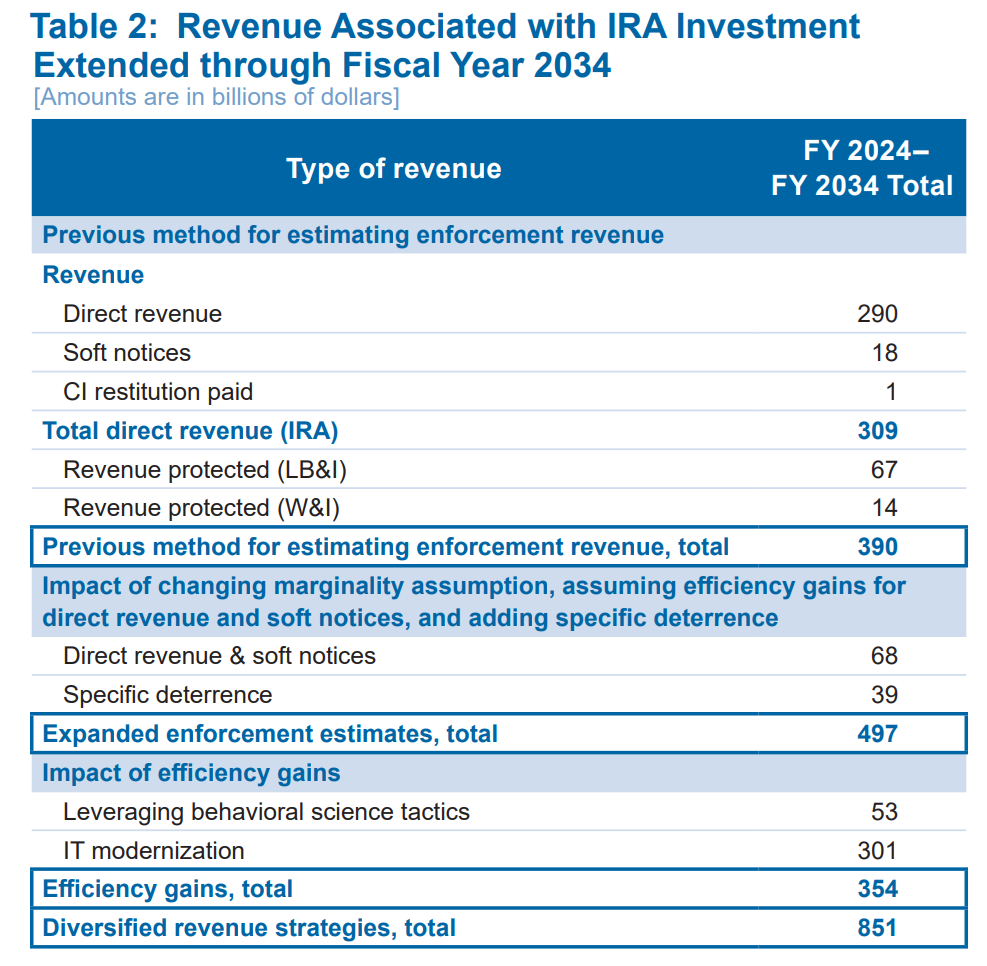Reimagined Article: The Impact of Inflation Reduction Act Funding on IRS Revenue Collection
Transforming Funding into Revenue: Treasury Department Analysis
A recent analysis by the Treasury Department reveals that the IRS has the potential to convert the nearly $80 billion in funding received from the Inflation Reduction Act into a staggering $561 billion in overdue and unpaid taxes collected over the next decade. This amount surpasses previous estimates and demonstrates the significant impact of this funding.
Renewal of Funding and Projected Revenues
According to the report, if the Inflation Reduction Act funding is renewed after it expires in fiscal year 2031, estimated revenues could reach as high as $851 billion. However, the Treasury cautions that a $20 billion reduction in the IRS’s funding allotment would result in a revenue decrease of over $100 billion.
“While the IRS would still be able to intensify enforcement against large corporations and wealthy taxpayers who evade their tax obligations in the coming years, the rescissions would exhaust IRA enforcement funding by 2029—approximately two years earlier than under the original IRA. This would diminish the revenue raised in 2029 and subsequent years,” stated the Treasury in a news release.
The Biden administration has proposed extending and maintaining IRS investments beyond the depletion of IRA funds, enabling the IRS to collect a staggering $851 billion from 2024 to 2034. Conversely, further cuts to IRS funding would result in reduced revenue collections and could jeopardize recent improvements in taxpayer service and enforcement efforts.
A Comprehensive Approach to Revenue Estimation
The Treasury report highlights that previous IRS estimates of Inflation Reduction Act revenues were limited to direct enforcement activities resulting from increased staffing. However, these estimates did not provide a complete picture of the revenue benefits derived from the innovative investments made under the IRA SOP (strategic operating plan).
By adopting a more comprehensive approach, which includes enhancing services to improve voluntary compliance, modernizing technology, and leveraging analytic advances, the report reveals that the investments in IRS technology, data analytics, and taxpayer services would generate a total revenue of $851 billion. This is more than double the estimates from the previous, conservative estimation process.
The Importance of Investments and Improvements
The report emphasizes the significance of investments in rebuilding the IRS due to a decade of deep funding cuts from Congress. These cuts resulted in inadequate service levels, prevented technological upgrades, and undermined enforcement efforts, particularly in relation to wealthy individuals and big corporations evading taxes.
Notably, the audit rate on millionaires decreased by over 70% from 2010 to 2019, and the audit rate on large corporations dropped by more than 50% during the same period. These funding cuts contributed to the widening of the tax gap—the disparity between taxes owed and taxes paid—which reached $688 billion in tax year 2021.
Positive Outcomes of Inflation Reduction Act Funding
Thanks to the improvements made through the Inflation Reduction Act funding, the IRS announced that it has already recouped approximately $482 billion in back taxes from wealthy tax evaders since October of last year. These achievements are a testament to the modernization efforts undertaken by the agency.

IRS Funding and Impact
In addition to its FY 2023 annual appropriation of $12.3 billion, the IRS received approximately $79.4 billion in supplemental funding over a 10-year period when President Joe Biden signed the Inflation Reduction Act into law in August 2022. However, lawmakers have rescinded about $1.4 billion of that funding, and an additional $20 billion will be cut and repurposed as part of the agreement reached last June between Biden and then-House Speaker Kevin McCarthy to suspend the debt limit and cap federal agency spending.
“This analysis demonstrates that President Biden’s investment in rebuilding the IRS will reduce the deficit by hundreds of billions of dollars by making the wealthy and big corporations pay the taxes they owe,” stated National Economic Adviser Lael Brainard. “Congressional Republicans’ efforts to cut IRS funding show that they prioritize letting the wealthiest Americans and big corporations evade their taxes over cutting the deficit.”
Read More of this Story at www.cpapracticeadvisor.com – 2024-02-06 23:04:18
Read More US Economic News
